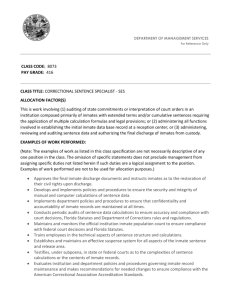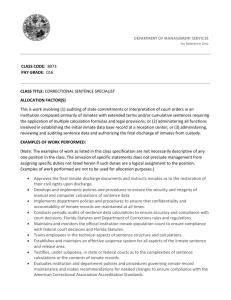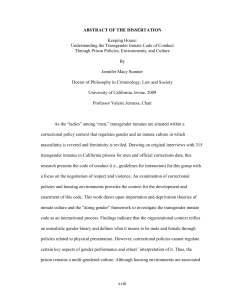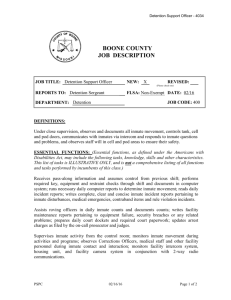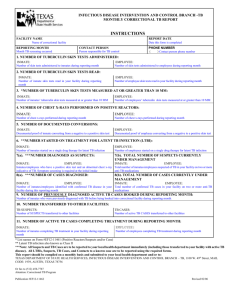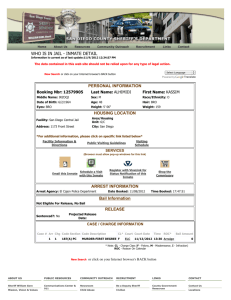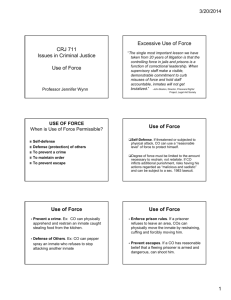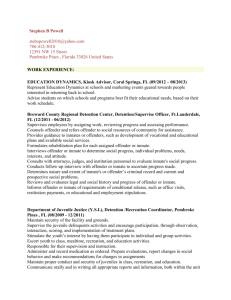Guide to Segregation in Federal Prisons
advertisement
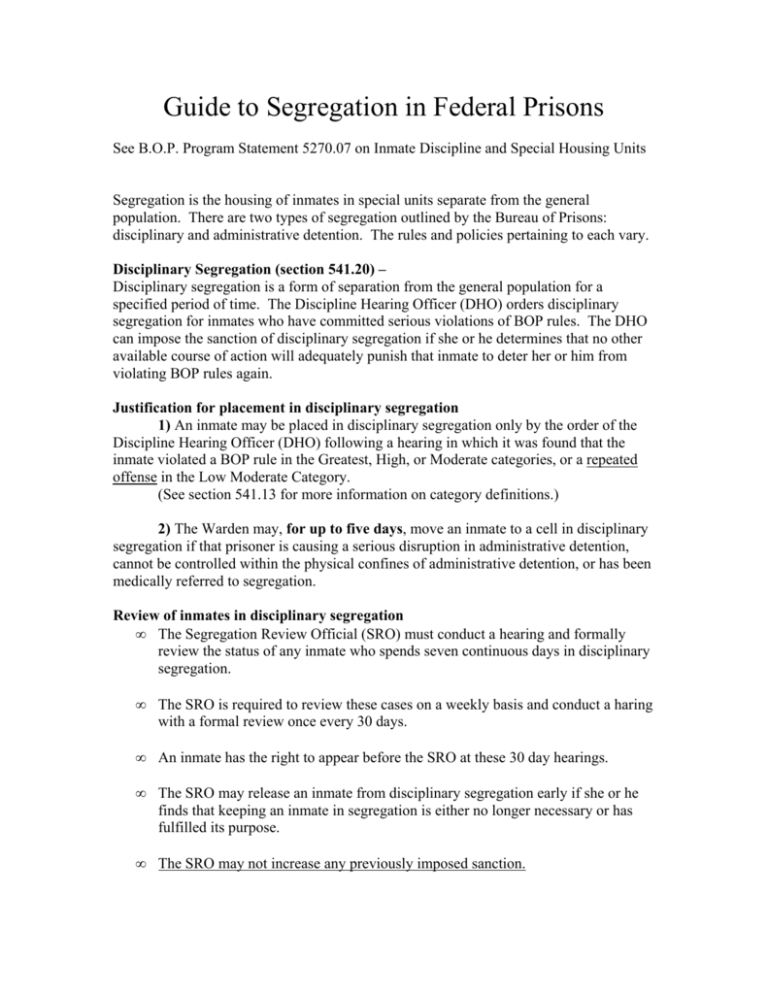
Guide to Segregation in Federal Prisons See B.O.P. Program Statement 5270.07 on Inmate Discipline and Special Housing Units Segregation is the housing of inmates in special units separate from the general population. There are two types of segregation outlined by the Bureau of Prisons: disciplinary and administrative detention. The rules and policies pertaining to each vary. Disciplinary Segregation (section 541.20) – Disciplinary segregation is a form of separation from the general population for a specified period of time. The Discipline Hearing Officer (DHO) orders disciplinary segregation for inmates who have committed serious violations of BOP rules. The DHO can impose the sanction of disciplinary segregation if she or he determines that no other available course of action will adequately punish that inmate to deter her or him from violating BOP rules again. Justification for placement in disciplinary segregation 1) An inmate may be placed in disciplinary segregation only by the order of the Discipline Hearing Officer (DHO) following a hearing in which it was found that the inmate violated a BOP rule in the Greatest, High, or Moderate categories, or a repeated offense in the Low Moderate Category. (See section 541.13 for more information on category definitions.) 2) The Warden may, for up to five days, move an inmate to a cell in disciplinary segregation if that prisoner is causing a serious disruption in administrative detention, cannot be controlled within the physical confines of administrative detention, or has been medically referred to segregation. Review of inmates in disciplinary segregation • The Segregation Review Official (SRO) must conduct a hearing and formally review the status of any inmate who spends seven continuous days in disciplinary segregation. • The SRO is required to review these cases on a weekly basis and conduct a haring with a formal review once every 30 days. • An inmate has the right to appear before the SRO at these 30 day hearings. • The SRO may release an inmate from disciplinary segregation early if she or he finds that keeping an inmate in segregation is either no longer necessary or has fulfilled its purpose. • The SRO may not increase any previously imposed sanction. Conditions of disciplinary segregation Inmates housed in disciplinary segregation have significantly fewer privileges than those in administrative segregation. The warden is required to ensure basic living levels of decency and humane treatment. These are: 1) Conditions of cell: The quarters used for segregation must be well ventilated, adequately lighted, appropriately heated, and maintained in a sanitary condition at all times. All cells must be equipped with beds. Strip cells may not be part of the segregation unit. 2) Cell: The number of inmates confined to each cell in segregation should not exceed the number for which the space was designated. The warden can approve increased occupancy if there is a pressing need. 3) Clothing and bedding: Inmates may wear normal institution clothing, but may not have a belt. Staff must furnish a mattress and bedding. Cloth or paper slippers may be substituted for shoes at the discretion of the warden. An inmate may not be segregated without clothing, mattress, blanks and pillow, except when prescribed by the medical officer for medical or psychiatric reasons. 4) Food: Inmates have a right to nutritionally adequate meals, usually from the menu of the day for the institution. 5) Personal hygiene: Inmates have a right to maintain an acceptable level of person hygiene. Staff must provide a toilet issue, a wash basin, a tooth brush, eyeglasses, shaving utensils, etc. as needed. Inmates should have the opportunity to shower and shave at least three times a week. 6) Exercise: Inmates have a right to no less than five hours of exercise a week. Exercise should be provided in five one-hour periods, on five different days. If circumstances require, 30 minute periods are acceptable if the five-hour minimum and different days scheduled is maintained. Weight training is not available to segregated individuals. The warden may withhold exercise periods from a segregated individual for up to a week if the inmate is deemed a threat. 7) Personal Property: Personal property will normally be impounded. 8) Reading material: Inmates should have access to a reasonable amount of nonlegal reading material. Religious scriptures of an inmate’s faith need to be provided. 9) Supervision: Segregated inmates are to be seen daily by a member of the medical department and a responsible officer designated by the warden, in addition to the direct supervision of the unit officer. 10) Correspondence and visits: Staff should make reasonable efforts to notify approved social visitors of any restrictions on ordinary visiting procedures. Time Constraints of Disciplinary Segregations (section 541.13) Offense Frequency of Offense Segregation Good Time Forfeiture Low Moderate 1st offense Up to 7 days 2nd offense Up to 7 days Up to 15 days 3rd offense or more within 6 Any sanctions in Moderate or Low months Moderate series Moderate 1st offense Up to 15 days Up to 30 days 2nd offense within 12 months Up to 21 days Up to 30 days 3rd offense within 12 months Any sanctions in Moderate or High series High 1st offense Up to 30 days Up to 60 days 2nd offense within 18 months Up to 45 days Up to 90 days 3rd offense within 18 months Any sanction in High or Greatest series Greatest 1st offense Up to 60 days Up to 100% Additionally, the DHO may also restrict the inmates’ privileges, take away the inmate’s job, order the inmate to make monetary restitution, transfer the inmate, or recommend that the inmate’s parole date be pushed back. Administrative Detention (section 541.20) – Administrative detention is a form of separation from the general population used when the continued presence of the inmate within the general population would pose a serious threat to the institution’s security. This housing status may include inmates who (1) require protective custody; (2) those who cannot be placed in local population because they are traveling to another institution (holdovers); and (3) those who are awaiting a hearing before the Unit Discipline Committee (UDC) or the DHO. Administrative detention status is a non-punitive status in which restricted conditions of confinement are required only to guarantee the safety and security of the institution. Time constraints on administrative detention • Inmates in administrative detention should receive an order explaining the reasons for their segregation within 24 hours of placement, provided institutional security is not compromised. • Holdovers will not receive an order. • Except for pretrial inmates or inmates in a control unit program, staff should either return the inmate to the general population or request a transfer within 90 days in post-disciplinary detention cases. Exceptions to this must go through the regional director or the warden. • Administrative detention is to be only for short-term periods of time except where an inmate needs long-term protection or where there are exceptional circumstances. The Segregation Review Official must document long-term protection needs. Review of inmates in administrative detention • The Segregation Review Official (SRO) must conduct a record review of inmates in administrative detention within 3 days of their placement, have a hearing, and a formal review for any inmate who spends seven continuous days in administrative detention. • After this, the SRO is required to review these cases every week and conduct a hearing with a formal review every 30 days. Inmates have the right to appear at these 30-day hearings. • Inmates must have a psychiatric assessment, including a personal interview, when they are in detention for more than 30 days. This assessment should address the inmate’s adjustment and any threats he may pose. Inmates in detention should have these assessments monthly. • At each formal review, an inmate should receive a written copy of the SRO’s decision and the basis for her or his finding. The SRO must release an inmate from administrative detention when reasons for placement cease to exist. Conditions of administrative detention • Basic conditions mandated for in disciplinary segregation apply to administrative detention. • If resources are available and security allows for it, inmates housed in administrative detention should have the same general privileges as inmates in the general population. • These same privileges include the opportunity for educational programming, library services, social services, counseling, religious guidance, and recreation. Except in compelling circumstances, inmates should also have commissary privileges and reasonable amounts of personal property. • Exercise, at a minimum, must meet the level established for disciplinary segregation and should exceed it where resources are available. • Inmates are allowed visiting, telephone, and correspondence privileges. Personal property ordinarily allowed in administrative detention includes: 1) Bible, Koran, or other scriptures 2) Books (paperback only) 3) Cigarettes 4) Coffee 5) Cups, drinking 6) Eye glasses 7) Fruits 8) Legal materials 9) Magazines 10) Magic shave 11) Mail 12) Newspapers 13) Personal hygiene items (except razors) 14) Photo albums 15) Authorized religious medals/headgear (ex: kufi) 16) Shower shoes 17) Snack foods 18) Soft drinks, powdered 19) Stationary/stamps 20) Sugar cubes 21) Tennis shoes (except those with steel shanks) 22) Tobacco (chewing and smoking) 23) Wedding band 24) Radio with headphones 25) Watch It may be necessary for the Chief Executive Officer to develop local limitations on the quantity and type of personal property allowed in administrative detention. Personal property may be limited or withheld for reasons of security, fire safety, or housekeeping, documented in unit records. Protective Custody The following categories of inmates may be considered as protection cases: 1) Victims of inmate assaults 2) Informants 3) Inmates who have received pressure to participate in sexual activity. 4) Inmates claiming to be former law enforcement officers, informants, or others in sensitive law enforcement positions, whether or not there is official information to verify the claim. 5) Former guards, dog caretakers, or others in similar positions in state or local correctional facilities. 6) Inmates who refuse to enter the general population because of alleged pressures from other unidentified inmates. 7) Inmates who will not provide the reason for refusal to return to general population. 8) Inmates who the staff has good reason to believe are in serious danger of bodily harm. Inmates must indicate on a placement for that they are requesting protection or are agreeing with the need for separation for protection reasons. Inmates who do not request or do not agree with their placement are to have their status reviewed by the warden or a designee within two working days of placement to determine if continued protective custody is necessary. A formal hearing is to be held within seven days of placement. Initial Disciplinary Hearings (section 541.15) The Unit Discipline Committee (UDC) • • • • The warden will delegate appropriate staff members the authority to hold a hearing after investigation of an incident (the UDC). These staff members may not be the reporting or investigating officers, witnesses to the incident, or have played a significant part in having the charges referred to the UDC. (Exception to this would be where nearly all staff members witnessed the incident.) The UDC can impose minor dispositions and sanctions if it finds an inmate has committed a prohibited act. If the alleged violation is serious and warrants further sanctions, the UDC must refer the charges to the Disciplinary Hearing Officer (DHO). All greatest category charges must be referred to the DHO. Standards of initial hearings 1) An inmate must receive a written copy of the charge against her or him, ordinarily within one day of the staff becoming aware of an inmates involvement in an incident. 2) An inmate charged with a rule violation is entitled to a hearing before the UDC, ordinarily within 3 working days of the staff becoming aware of the inmate’s involvement in an incident. 3) With the exception of security concerns, an inmate is entitled to be present at her or his initial hearing. The UDC must clearly document in the record reasons for excluding an inmate from the hearing. An inmate may waive her or his right to attend the hearing and this must be documented on a waiver form. 4) An inmate can make a statement and present evidence on her or his own behalf. 5) The UDC can drop for informally resolve Moderate or Low-Moderate charges. The UDC must expunge the inmate’s file of the incident report if the charge is dropped. 6) The UDC must consider all of the evidence presented at the hearing and make a decision based on at least some facts. If there is conflicting evidence, the decision must be based on the greater weight of the evidence. The UDC must ultimately come to one of the following decisions: a) Find that the inmate committed the prohibited act and/or a similar prohibited act if reflected in the incident report b) Find that the inmate did not commit the prohibited act and/or a similar prohibited act if reflected in the incident report. c) Refer the case to the DHO for further hearing. 7) The UDC must give the inmate a written copy of the decision and disposition by the close of business on the next working day. Any action taken as a minor disposition is reviewable under the Administrative Remedy Procedure. 8) The UDC must prepare a record of the proceedings to be kept in the inmate’s file. 9) If alleged violations are serious and might call for something more than minor sanctions, the UDC will refer the charges without indication of findings to the DHO for hearing and disposition. The UDC will forward all relevant documents with a brief explanation for the referral and recommendations for the appropriate disposition if the inmate is found guilty. If an inmate’s charge is referred to the DHO, the inmate may be retained in administrative detention, but the UDC cannot impose a final disposition on the matter until settled. 10) Inmates whose charges are referred to the DHO must be informed of their rights at a DHO hearing. The inmate should be asked for her or his preference of staff representation, if any, and the names of any witnesses to be called (and the testimony expected of them). The inmate may waive her or his right to appear at the hearing and still have witnesses and representation on her or his behalf. 11) If the UDC holds a full hearing and finds that the inmate DID NOT commit a prohibited act of High, Moderate, or Low-Moderate severity, the UDC must expunge the inmate’s file of the Incident report. All alleged acts of Greatest severity must be referred to the DHO. 12) The UDC may extend the time limits imposed for good causes shown by the inmate or staff and documented in the record of hearing. The Discipline Hearing Officer (DHO) Each Bureau of Prisons institution must have an independent Discipline Hearing Officer (DGO) assigned to conduct administrative fact-finding hearings covering alleged acts of misconduct and rule violations, including those that could result in criminal charges. Standards for DHO’s and DHO hearings are: 1) DHO cannot be the reporting officer, investigating officer, UDC member, witness to the incident or have played any significant part referring the charge to the DHO. 2) An alternate DHO will be assigned if there is an emergency or an offense is committee in the presence of the presiding DHO. Alternate DHO must be trained and certified as a DHO. 3) The DHO cannot hear and case or impose any sanctions in a case not heard and referred by the UDC. Only the DHO can impose or suspend the Greatest level severity sanctions. 4) The warden must designate a staff member to conduct reviews of inmates placed in disciplinary segregation (the Segregation Review Official). 5) The warden must give an inmate advance written notice of the charge against her or him no less than 24 hours before the inmate’s appearance before the DHO. 6) The warden must provide the service of a full-time staff member to represent an inmate before the DHO, if the inmate desires. No one in any way involved in the case may act as this representative. This staff representative is available to assist the inmate if she or he requests by speaking to witnesses and presenting favorable evidence to the DHO on the merits of the charge. The inmate may select another staff representative should her or his first choice decline or is otherwise unavailable. If several staff members decline, the warden will appoint a staff member. The representative must be given adequate time to speak to the inmate and witnesses. 7) An inmate is entitled to make a statement and present evidence on his or her own behalf. Excluding security concerns, the inmate also has the right to submit names of witnesses to be called on his or her behalf; these can include witnesses from outside the prison. The DHO must document in the DHO report (or a separate report if reasons are confidential) reasons for declining to call witnesses. The inmate’s staff representative (or DHO when no representative was requested) will question witnesses. Inmate may submit questions for witnesses to the DHO. If excluded from the hearing, the inmate will be informed of the substance of the witnesses’ testimony. 8) There is no minimum or maximum number of witnesses who may be called. The number of character witnesses called may be limited. The DHO may not refuse to call a witness who is reasonably available and who has information directly relevant to the charge solely because the witness does not wish to appear. There must be an indication that the witness is relevant. The DHO will ordinarily allow sufficient time for witnesses not reasonable available to submit written statements. 9) An inmate has the right to be present throughout the DHO hearing, except during deliberations and when security would be jeopardized. Any reasons for excluding an inmate from a hearing must be documented. The DHO may conduct a hearing without an inmate if the inmate is for some reason absent from custody. When the inmate returns to custody, the warden will have the charges reheard before the DHO within 60 days of the inmate’s return to custody. All of the applicable procedural requirements still apply, and the DHO can re-affirm the earlier action, dismiss the charge, or modify the findings. 10) The DHO can refer a case back to the UDC, postpone, or continue a hearing at a later date whenever further investigation or more evidence is needed. A postponement or a continuance must be documented and be for good cause. 11) The DHO must consider all of the evidence presented at the hearing and make a decision based on at least some facts. If there is conflicting evidence, the decision must be based on the greater weight of the evidence. The DHO must ultimately come to one of the following decisions: a) Find that the inmate committed the prohibited act and/or a similar prohibited act if reflected in the incident report. b) Find that the inmate did not commit the prohibited act and/or a similar prohibited act if reflected in the incident report. 12) The DHO must prepare a record of the proceedings. This record must document the inmate’s advisement of her or his rights, the DHO’s findings, the DHO’s decision and the specific evidence that was used to come to the decision. In judging conflicting evidence, the DHO must indicate in the record her or his reasons for accepting what she or he did. The DHO must give the inmate a written copy of the decisions and dispositions, normally within 10 working days of the decision. 13) A record of the hearing and supporting documents are to be kept in the inmate’s file. 14) The DHO must expunge the inmate’s file of the incident report if the DHO finds the inmate did not commit the act in question. A copy of the hearing will be kept on file, however, but will not ever adversely affect the inmate. 15) To ensure that disciplinary proceedings are done correctly, the DHO will prepare a procedural checklist to put in the discipline report place in the inmate’s central file. 16) The warden is to audit and review disciplinary hearings and dispositions to assure conformity with B.O.P. policy. The warden may return a disciplinary action to the DHO for rehearing or other indicated action after determining that the action or hearing did not conform to policy. The warden’s reasons must be documented. Appeals of Disciplinary Hearing Action (section 541.19) – When the Unit Discipline Committee (UDC) or Discipline Hearing Officer (DHO) gives an inmate written notice of their decision, they must also advice the inmate the she or he may appeal the decision under the Administrative Remedy Procedures. • An inmate’s appeal of a decision of the DHO should be filed directly to the appropriate Regional Office. The inmate should forward a copy of the DHO’s report or, if not available, should state in her or his appeal the date of the DHO’s hearing and the nature of the charges. • On appeals, the appropriate reviewing official can approve, modify, reverse, or send back with directions (including ordering a rehearing) any disciplinary action of the UDC or DHO, but cannot increase any valid sanction imposed. • The reviewing official for decisions by the UDC is the warden. Appeals need to be filed with the warden on Form BP-229 (13) within 15 calendar days of the inmate’s written notification. • The reviewing official for decisions by the DHO is the Regional Director. Appeals need to be filed with the Director on Form BP-230 (13) within 20 calendar days of the inmate’s written notification. The warden may also review these decisions. The DHO may receive informal complaints about procedure and correct mistakes locally before the review. Items that must be considered in a review: 1) Whether the UDC or DHO complied with regulations on inmate discipline. 2) Whether the UDC or DHO based its decision on some facts, and if there was conflicting evidence, whether the decision was based on the greater evidence. 3) Whether an appropriate sanction was imposed according to the severity of the offense and other relevant circumstances. • The reviewing official’s review is only to determine if the disciplinary action can be rationally concluded from the evidence supporting it, not whether the reviewer agrees with the decision. • The investigator, UDC members, DHO reporting officer, and staff representative may not investigate or assist in preparing the response to administrative appeals from the UDC or DHO. • When an appeal results in the original sanction being replaced by a suspended sanction, that suspension is to run from the date that the original disciplinary sanction was imposed. • After an appeal, the inmate is to be provided a written notice of the reviewer’s decision.
